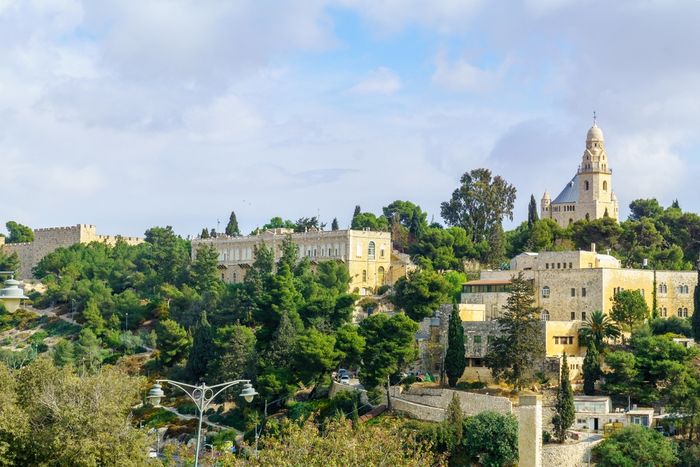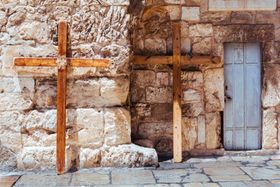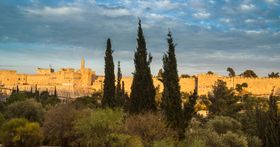Mount Zion and Its Biblical Significance
Updated December 10, 2024.

Situated in Jerusalem just outside the walls of the Old City and along the Armenian Quarter, Mount Zion is a sacred and biblically important site. We're here to explain more about its history and relevance.
What Is Mount Zion?
Mount Zion is a religious tourist attraction. Set at the highest point in the city, this magnificent location boasts a beautiful temple and was the setting for numerous important events in the Bible. In ancient times, the whole of Jerusalem, including the Temple Mount, was referred to as Jebusite Mount Zion. As such, Zion is described in Psalms as "the City of our God".
The Biblical References to Zion
Zion is first mentioned in the Bible in 2 Samuel 5:7: “David captured the fortress of Zion—which is the City of David.” The area was referred to under different names before this, however.
It was here that Abraham agreed to sacrifice his son with the faith that God would “provide Himself a lamb for a burnt offering” (Genesis 22:1-24). This is arguably the biggest sacrifice in the Bible.
In Genesis 28, Jacob was allowed to climb to Heaven by way of a dream atop Mount Zion. Therefore, the mountain provided a way to get closer to God in a very literal sense.
On the hilltop summit, David bought the threshing floor of Ornan the Jebusite and atoned for his sins with sacrificial oxen (1 Chronicles 21:14-18). This illustrates the power of God and the importance of rulers showing humility.
On Mount Zion, Solomon built the enthralling temple of the Lord (2 Chronicles 3:1) – one of the most spiritually important locations on earth.
What Mount Zion Represents in the Bible
A Place Where Faith in God Was Tested
In each of the references to Mount Zion, enormous faith in God is required, whether through sacrifice, asking for forgiveness, or beginning a journey of the soul, such as climbing to Heaven. Each figure had to place a huge amount of trust in God's hands in order to move forward.
The Eternal City and the Location of Christ’s Rule on Earth
Zion was referred to 157 times in the Old Testament and 7 times in the New Testament. It was used to describe more than just the mountain. It represented The City of David (2 Samuel 5:7; 1 Kings 8:1; 1 Chronicle 11:5), the city of Jerusalem (Isaiah 33:20; Isaiah 40:9; Psalm 51:18), the Millennial Jerusalem (Joel 2:32; Isaiah 2:2-3), and the eternal or Heavenly Jerusalem (Hebrews 12:22; Micah 4:7; Isaiah 35:10). The use of Zion as the Jewish nation (Isaiah 33:14; Zechariah 9:13) lent itself to the phrase "Daughter of Zion".
This was also the place that Jesus ruled while He lived on earth.
Zion Is the City of David, the Descendant of Christ, and a Spiritual Location for God
David was believed to be Christ's descendant. Zion is also a place where people return for a connection with God: “And the ransomed of the Lord shall return and come to Zion with singing; everlasting joy shall be upon their heads; they shall obtain gladness and joy, and sorrow and sighing shall flee away” (Isaiah 35:10). “May the Lord bless you from Zion; may you see the prosperity of Jerusalem all the days of your life" (Psalm 128:5).
The Setting of the Last Supper
It is believed that the famous Last Supper took place on Mount Zion, where Jesus predicted Judas's betrayal. This set the series of events leading up to the crucifixion and resurrection in motion, allowing Jesus to atone for our sins.
What Are the Gates of Zion?
One of the seven historic gates of the Old City of Jerusalem, the Zion Gate (or Gates when including a reference to the Tomb of King David which is situated on Mount Zion), is a direct entrance to the Armenian and Jewish Quarters. It is also known as the Prophet David Gate or Jewish Quarter Gate. Approaching from these quarters, the gates are also seen as the entrance to Mount Zion. King David was buried there according to Muslim, Jewish, and Christian traditions.
Mount Sinai vs. Mount Zion
Moses thought he had come to Mount Sinai and trembled in fear of the Holy Law of God. But God answered that he had come to Mount Zion, where a new covenant based on a closer relationship with God rather than His laws took priority. Mount Zion was a warm place of welcome.
"But you have come to Mount Zion, to the city of the living God, the heavenly Jerusalem. You have come to thousands upon thousands of angels in joyful assembly, to the church of the firstborn, whose names are written in heaven" (Hebrews 12: 22-23).
Mountains are able to bring us closer to nature, the heavens, and quiet contemplation. Mount Zion is the perfect and most beautiful example of this.






